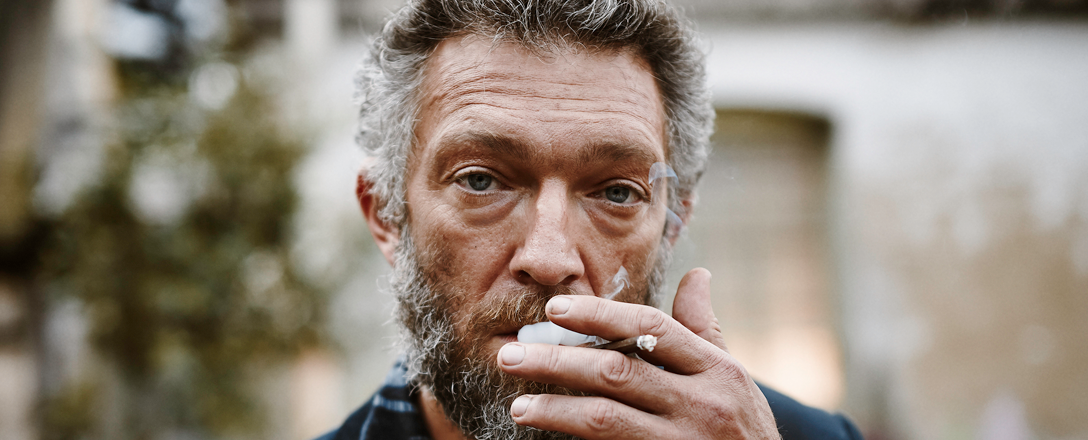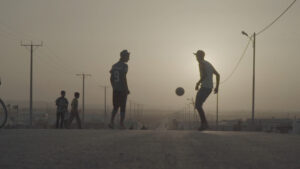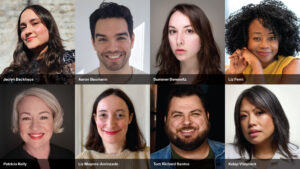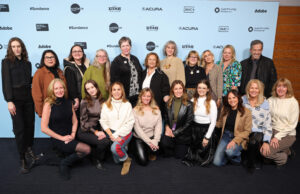Eric Hynes
Transitioning from short films to features is treading a familiar, tried and true path for filmmakers. But there’s a rare tribe of filmmakers who pass through the selection gauntlet to place a film in the Sundance Film Festival shorts program, and then prevail over another, equally daunting competition to do the same for a feature film. To achieve that, you must be doing something right. Going one better than notable repeaters Damien Chazelle (Whiplash) and countryman David Michod (Crossbow, Animal Kingdom), the 29-year-old Australian director Ariel Kleiman has twice arrived in Park City with shorts (Deeper Than Yesterday and Young Love), and returned to the 2015 Festival with a long-gestating feature, Partisan.
Partisan is the story of an 11-year-old boy named Alexander (newcomer Jeremy Chabriel) who’s the oldest son of a really, really extended family, in which a single, charismatic father named Gregori (Vincent Cassel) lives with 8 wives and numerous children in a secluded, self-contained apartment complex. As a father, Gregori is attentive, benevolent, and hands-on, but his methods can be extreme, and there’s also the fact that he’s training his children to commit some highly questionable acts. Kleiman creates a world that’s simultaneously seductive and menacing, utopian and dystopian.
In advance of the Festival, we talked to Ariel Kleiman about the challenges he faced in graduating to feature filmmaking, directing both an international star and nonprofessional actors, and staying fresh over the long haul.
I would imagine that there’s a huge difference between making a short in which you can go from script through production in a relatively short span of time, and getting through a film that’s several years in the making. Was it difficult to stay with something for such a long haul, after experiences of more immediate gratification? Or were you just excited to be doing it?
Ever since you start making films you hope to make a feature one day. But being excited doesn’t really help you that far. I think [having] stamina, over the length of the project, is probably the hardest thing to deal with. It’s literally 50 to a hundred times longer [than making a short]. Stamina is the thing you can’t really prepare for.

Even from muscle memory, there must have been part of you that after a year wanted to move on to something else. Considering how long you’re going to be with it, you really have to love your story.
Luckily I did love this one, and others did too. It was never an issue of growing out of love with it, or being sick of it—it was more like the constant battle to stay fresh. You want to be watching it with fresh eyes, and you want to be analyzing it with fresh and truthful eyes.
Was there much difference between what you first conceived for the project and what it became? Were you realizing what you’d first envisioned, or finding it along the way?
I recently read the treatment or synopsis that I wrote at the beginning, and it’s incredibly similar. So tonally, the story and the characters are incredibly similar to what we started out to make. Obviously along the way there’s a million surprises and changes and detours, but the core of this film is very similar to the initial concept.
How did you manage to maintain that original vision?
I guess we spent the largest amount of time on this film writing the script. It took around three and a half years. And this script was incredibly detailed. It was kind of like reading a novel. A lot people got annoyed by that, and a lot of people really liked it. I guess because the film is so tonally driven, you could really grasp the tone of what this thing was going to be. I wrote it with my girlfriend Sarah Cyngler, who also did costume and production design. That’s the way we’d worked on the shorts, too. There was even a lot of detail of how things were going to look in the script. So it was great to have that as a blueprint to fall back on throughout the whole process. Anyone who got involved read that script and if they loved it they loved it, and they knew what they were getting themselves into.

So you weren’t just writing a script, you were setting yourself up with, as you called it, a blueprint for how it was going to look and feel?
It was partly like we were learning how to write a script [laughs], and the other part was that we were creating a world essentially from scratch. It’s like a world that the main character has created. We were getting inside that guy’s head, and the whole film is set in a reality that he’s created. Literally everything you see in the frame was chosen by the main character.
To what degree was this a found location, or did you have to create it?
Basically we were looking for a building, a U-shaped building with an internal courtyard, that it could house people in the surrounding building and that they could exist communally within the internal courtyard. Where essentially the outer building fully blocks them away from the outside world. That architecture I guess is really common in Europe, especially Eastern Europe. I’d done a lot of traveling in Eastern Europe, and my parents actually grew up on a similar apartment block, and that architecture from the very beginning became inspiration for how these people are living, and how they’ve managed to block themselves away. The tricky part was finding that in Melbourne, where all those scenes were shot.
Did Brezhnev or Khrushchev preside over the building of any apartments in Melbourne?
I wish they did. In the end we were very lucky. If we didn’t find this place I do not know where else we could of shot. My previous short was shot on a submarine, and it kind of felt the same—like, if we didn’t shoot on that submarine I don’t think I could have made the movie. And as strange as it sounds, if we didn’t find this property I don’t know how we would have created this [movie]. It’s essentially an old boys home on the outskirts of Melbourne. It used to house delinquent boys, and had been recently bought and refurbished by a winery, and they had left one building in this winery as it was—it was essentially untouched. So we were lucky enough to take over that. And so, essentially all the interiors were shot at that location. Basically what existed there already was just free wall, and we filled the rest in.
How much time did you have to fill them in with what you’d so painstakingly planned?
I think we were building it for four weeks. And then we shot for five weeks in Melbourne, and one week overseas for the exteriors.
Sometimes that kind of architecture can be appealing, fostering close-knit communities, but then you think about how trapped somebody can feel in a space like that. It also evokes this retro-hippie culture that’s around again, this back-to-the-land ethos that can also be both appealing and isolating. Was there something about your seeing these movements in the world right now that made you both attracted to and repulsed by the notion of a closed community?
For me, it’s just fascinating the stories where people remove themselves from something negative that they see in the world, but inevitably that stuff creeps up into the enclosed community anyway. It’s inherently quite absurd. Absurdist in quite a comedic way. I guess I’m a pretty private person myself—I like to spend time alone—but I also love the vibrancy of the city. So I don’t think I could ever live rurally. I love the energy of the city, I feel like it feeds me.
In creating Gregori, were you able to relate to some of his impulses?
Yeah totally. Day-to-day I’m often like “fuck these people,” I want to do my own thing [Laughs]. It’s like when someone starts their own family, a moment in time when you can create a family the way you want your family to be run. And you might say I don’t want to do it like this or that person, or I don’t want to do it like I was raised. I’m going to create a family in my perfect vision. There’s a strong part of that in the movie. It’s obviously an extreme case, but he’s creating a family and a childhood he might never have had. Out of pure love, really. He comes from a pretty twisted, but pure place. The tragic part of the movie is the issues that this guy has and is passing on to his kids. As much as any parent tries not to, they’re going to pass on some shit to their kids.

The fact that Alexander is turning 11 at the outset of the film seems important. He’s not yet as rough as young men can get—he’s still an innocent, there’s a purity that’s important to how we find him. He’s not looking to supplant or overtake his father, he’s following him, and figuring out how to love and fear him.
The film is called Partisan because Alexander is the partisan. He’s a devout follower. Kids up to that age are devout followers of the adults around them. They don’t know any better. Why do we study mathematics? Because an adult told us to. We can’t question it. It’s been explored a lot in movies because it’s a very fertile ground for drama.
What was it like working with Vincent Cassel? Was it your first time working with an actor with such a storied track record?
It was pretty much my first time working with an actor. I’ve worked with a lot of street cast people, non-trained people. So it was a really new experience for me. I don’t know if I lucked out or chose well, but he kind of figured out what he was getting into, and wanted to get himself into that.
How did working with a pro affect your approach to directing?
For every film I’d [previously] made I had long periods of just spending time with the actors. Not even rehearsing but just getting a barbeque or a few beers. The terrifying part was that though I was obviously very familiar with Vincent as an actor, I didn’t know him at all as a human, as a guy. His time was very tight, but luckily I was able to get him for a week [before the shoot], and I was essentially his driver for a week. Everywhere we needed to go I just drove him around and we hung out. I guess from that point on it made it really easy. He knew who I was, and I knew where he was coming from. And he was incredibly generous and really supportive of me. It was massively differently from anything he’d ever done. He was basically surrounded by kids and eight untrained ladies—first-time actors. I think it would have been difficult for any actor. But I think he was just into the vision, into the script, and wanted to be part of it.
What was it like to toggle between an experienced star and non-actors?
You have basically those three camps, and the way I was communicating with everyone was really different. But the core of the direction for me was the same—the way I was communicating with Jeremy was actually similar to how I was communicating with Vincent. I guess it was about keeping it incredibly simple, creating the groundwork for shooting, so that they know what each scene is about and where they are in that scene, how they’re feeling. I’m just there to guide them in the simplest way to get to that point.
You know that Vincent can provide what you needed, but how do you know that children can pull it off? Are they just bringing a totally different energy?
It’s like different degrees along the same scale. As a director I don’t want to tell the actor how to do things. With a kid you definitely can’t tell them how to do things [laughs]. They’re not going to do it. So it’s along the very far right hand part of the scale, where you’ve got to set these parameters and film it. Whereas with Vincent I equally don’t want to tell him how to go about playing the scene, but I’m there to kind of create an environment where he can do his best work, and I can capture it. Jeremy, the boy who plays Alexander, who’s pretty much in every scene of the film, I don’t think I’m over-exaggerating in saying that by the end of the movie I really was communicating with him as if he was a professional actor. That’s how much he developed through the process and how smart he is as a kid. When you’re in every scene of the movie, you’re inevitably going to have to act. Adapting is the main thing. And what he did was very impressive.
Between bringing in an experienced actor who has strong ideas about his craft, working with an outside editor for the first time, and recruiting a composer, Daniel Lopatin, who brings such a strong, unexpected flavor to the film, was it challenging to give up some of the control you’d had in the past?
As I said before, the biggest challenge was staying fresh—an idea that I had in 2010 is not necessarily going to be best for the movie. The most exciting, and frankly easiest part of getting through it was collaborating with amazing people, to see what they bring to it.




